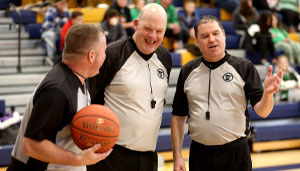When coaching younger teams, or teams that are comprised of sensitive individuals, it is often a challenge for a coach to find the right way to point out mistakes without devastating the psyche of some athletes. At the same time, most sports have a myriad of postgame chores – lugging bags to the shed, moving benches, putting plugs in bases, whatever. While these two issues may seem disconnected, try to see if you can accomplish the old adage “kill two birds with one stone.”
As many have written before, all athletic events encompass failure. I have yet to see any team have a “perfect” game. There are two types of failure, however: mental and physical failure. Physical failure requires an individual to learn to live with it; athletes do not “try” to strikeout, let a shot go through their legs, or drop a pass, but that is all part of the game and you don’t need to harp on a player for these obvious mistakes. Those mistakes also happen with mental failure. Mental mistakes are the ones that you need to address almost immediately after a game because those are the areas that should not be tolerated. At the same time, you don’t want to belittle the athletes or cause them to second-guess everything that they do. Finding the right way to do this is the key.
As part of our postgame softball ritual, our team huddles briefly in the outfield. It’s there that we talk for a moment about the game, the things that we collectively did well or did poorly, and what the upcoming challenge will be. We recognize outstanding efforts; if it is a home game win, those players get a game ball and the accolades of their teammates. A loss, and we discuss where we fell short and what we need to do in the future. Then, win or lose, the fun and the learning truly begins – it is time to assign bags.
In softball there is always equipment to get schlepped. Water jug, med kit, bats, helmets, extra catcher’s gear, etc., it all needs to go somewhere. As we meet in the outfield, we conclude our meeting with penalizing those who made mental errors during the game. Missed a sign? Carry a bag. Called third strike? Carry a bag. Didn’t run with two outs? Carry a bag. As you can see, it is mental mistakes that are being penalized, but also being penalized in a pretty minor way. It points out to everyone the mistakes that are happening and will not be tolerated, while at the same time not punishing or pointing out things so severely that athletes become terrified of failure. Sometimes the coach even gets a bag, to the enjoyment of the team – an ill-advised waving of a runner to home will do that every time. You will need to get creative at times to find mistakes, and sometimes teammates will join in on the fun and point out mistakes that may have went unnoticed. Those are the best because the offender gets a bag for the mistake, while the teammate gets one for ratting her out.
At the end of the game you have accomplished a few key things:
- You have pointed out to your team mental mistakes that were made;
- You have addressed them without crushing anyone’s feelings;
- Your equipment is put away;
- You didn’t have to turn to the last person on the bench, who didn’t get in but always volunteers, to carry things because that is what they do, and
- Finally, more often than not, your huddle ends with laughter and smiles by all involved; a great way to learn and move on from the last game.
Dan Meserve
Dan Meserve is a teacher, softball coach and athletic director at Hopkinton High School in Contoocook, New Hampshire. He is a member of the NFHS Coaches Publications Committee.
Most Recent Articles
- nfhs news NFHS Learning Center Delivers 25 Millionth Course
- Track & Field/Cross Country article Effective Communication with Athletes and Coaches
- nfhs news Player Equipment Changes Highlight 2025 High School Football Rules Revisions
- Player Equipment Changes Highlight 2025 High School Football Rules Revisions
- nfhs news Judgment Call on Second Contact Eliminated in High School Volleyball






